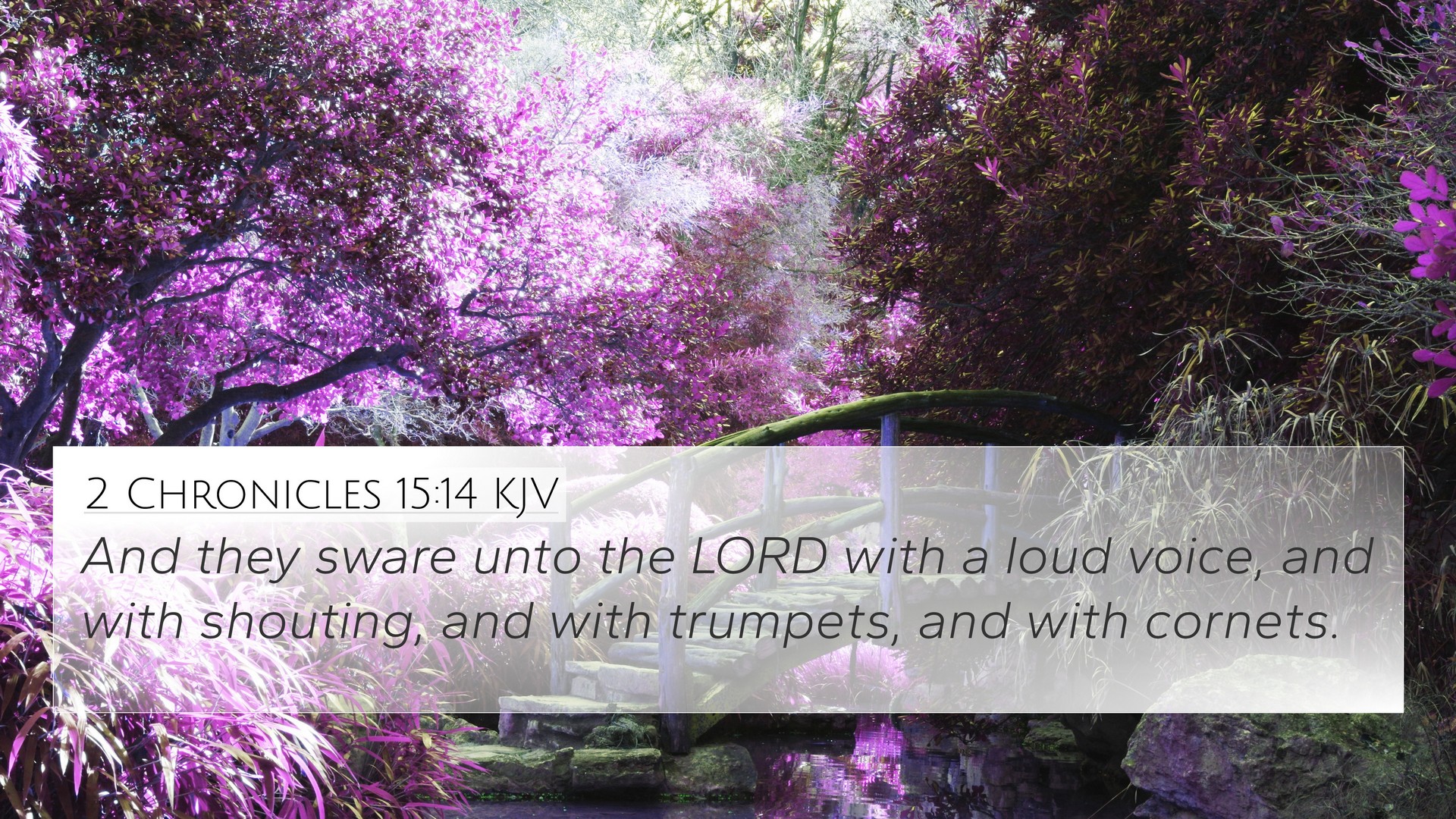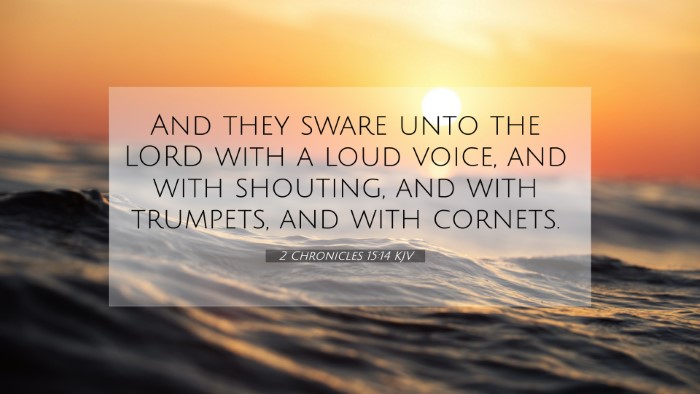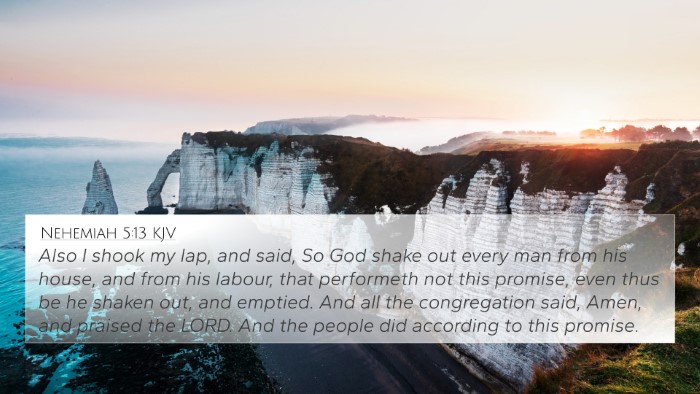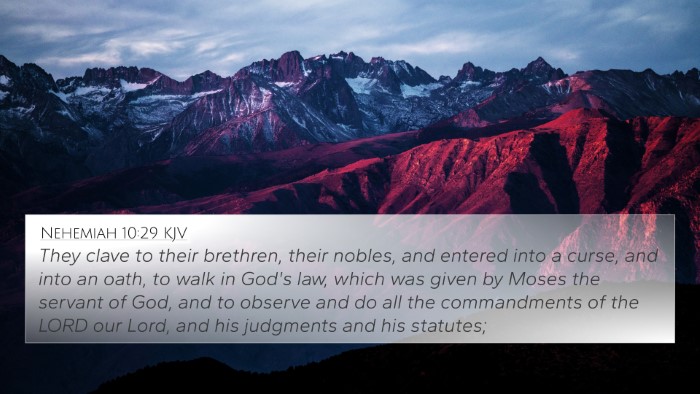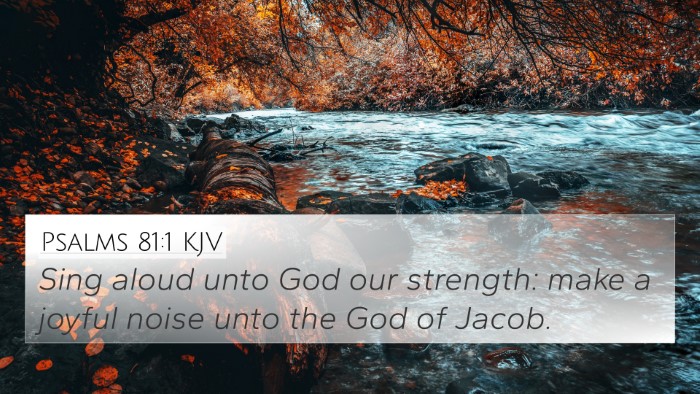Understanding 2 Chronicles 15:14
2 Chronicles 15:14 states, "And they swore unto the LORD with a loud voice, and with shouting, and with trumpets, and with cornets." This verse captures a significant moment of national commitment and collective worship among the people of Judah under King Asa.
Explanation of the Verse
This verse occurs in a pivotal context where King Asa leads the nation back to a covenant relationship with God. The people responded to the call for reform and renewal by making a solemn vow to the Lord, showcasing their devotion and unity. The manner in which they swore is notable—it was accompanied by loud voices, shouts, and musical instruments such as trumpets and cornets. This reflects not only their sincerity but also the joy and excitement of recommitting themselves to God.
Theological Significance
The act of swearing an oath to the Lord signifies the seriousness of their commitment. It is reminiscent of covenant-making practices throughout Scriptures, emphasizing the need for a community to recognize their dependence on God and fulfill their duties towards Him. By gathering together in a public declaration, the people of Judah exemplified the strength found in communal faith and worship.
Insights from Commentaries
- Matthew Henry: Henry highlights the importance of public worship and the enthusiasm displayed by the people. He notes that such enthusiasm is essential for the renewal of faith and community bonds. The instruments used symbolize both celebration and solemnity, akin to how God desires His people to worship Him.
- Albert Barnes: Barnes points out that the swearing with a loud voice indicates genuine conviction and resolve. He connects this with the broader biblical context where similar acts of declaring loyalty to God are observed, reflecting a pattern of God’s people responding to His call through solemn commitments.
- Adam Clarke: Clarke elucidates that the act of swearing was not just an individual commitment but a collective national undertaking. He emphasizes that in moments of spiritual awakening, communities often experience revitalization through vibrant expressions of faith such as those seen here.
Cross-Referencing Biblical Texts
To further understand the weight of 2 Chronicles 15:14, we can explore several related Bible verses:
- Exodus 19:5-6: This passage discusses the covenant between God and Israel, underscoring the significance of obedience and commitment.
- Deuteronomy 30:19-20: A call to choose life and maintain a relationship with God is echoed here, linking to the themes of choice and commitment seen in Chronicles.
- 1 Samuel 10:24: Here, the people shout in agreement with Saul’s kingship, which parallels the collective consensus seen in Asa’s time.
- Psalms 132:2-5: This Psalm reflects the zeal and determination of David to build a dwelling for the Lord, similar to the fervor displayed in Chronicles.
- Romans 12:1-2: Paul encourages believers to present themselves as living sacrifices, a concept akin to the dedication shown by the people of Judah.
- Hebrews 10:24-25: This encourages believers not to neglect gathering together, emphasizing the importance of communal worship and mutual encouragement in faith.
- Matthew 5:37: In the New Testament, Jesus teaches about oaths and the importance of honesty and integrity, tying back to the serious nature of the commitments made in 2 Chronicles.
- Joshua 24:24: The people affirm their commitment to serve the Lord, similar in context and significance to Asa’s era.
- 2 Kings 11:17: The covenant made between the Lord and the people parallels the commitment made in Chronicles.
- Ezra 10:3: The people of Israel make a covenant to put away their foreign wives, showcasing communal integrity and devotion to God.
Thematic Connections
The public declaration in 2 Chronicles 15:14 invites thematic conclusions relevant throughout Scripture:
- Unity in Worship: Collective worship and dedication are vital in engaging faith as a community, an idea expanded across both Old and New Testaments.
- Joyous Responses to God: The expressions of joy accompanying their commitment are a reminder that God desires passionate worship.
- Reform and Renewal: As seen continually in biblical history, returning to God involves both individual and communal efforts of reform, showing God’s faithfulness to those who seek Him.
Applying the Message Today
In modern contexts, believers can take inspiration from the collective actions present in 2 Chronicles 15:14. In communal worship settings or church services, the spirit of unity and enthusiasm can be fundamental to revitalizing faith. This verse challenges congregations to express their commitment with sincerity, potentially leading to broader spiritual renewal within their communities.
Conclusion
2 Chronicles 15:14 serves as a reminder of the power of communal oaths and the celebration of faith. Through cross-referencing other biblical texts, we can see a pattern of commitment and covenant that transcends time. The engagement of the people in Asa's time illustrates the importance of worship, community, and a heartfelt return to God.
